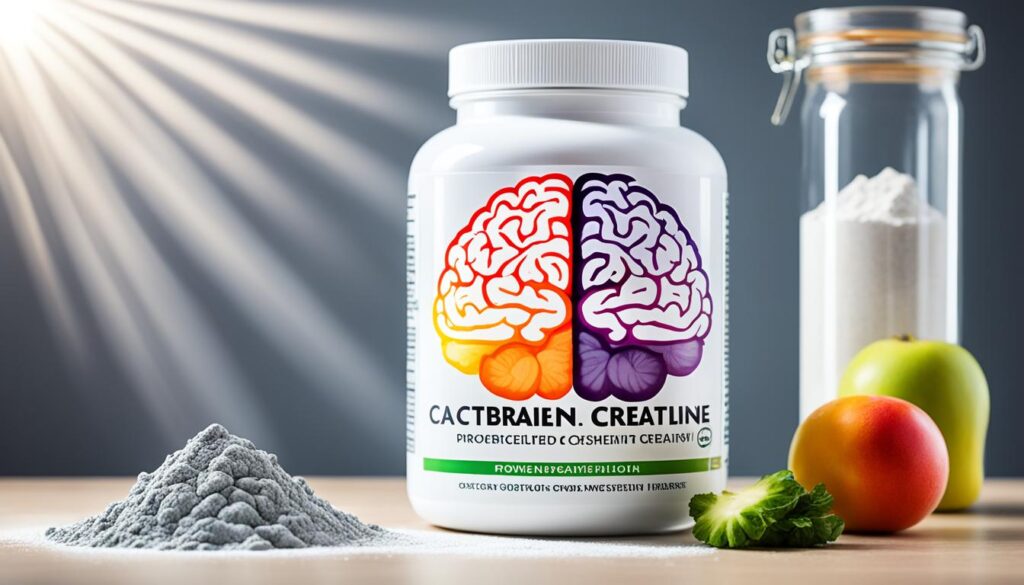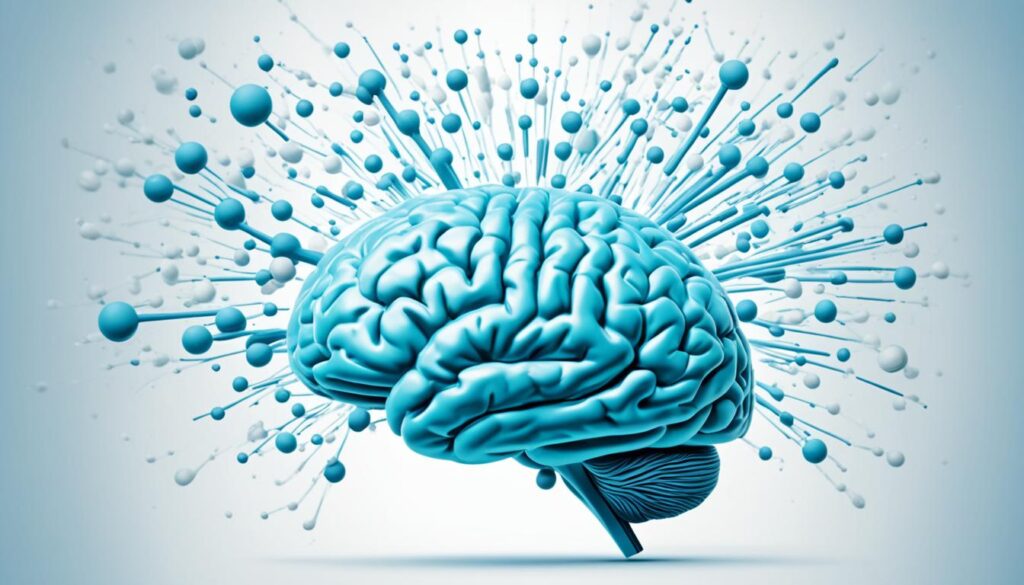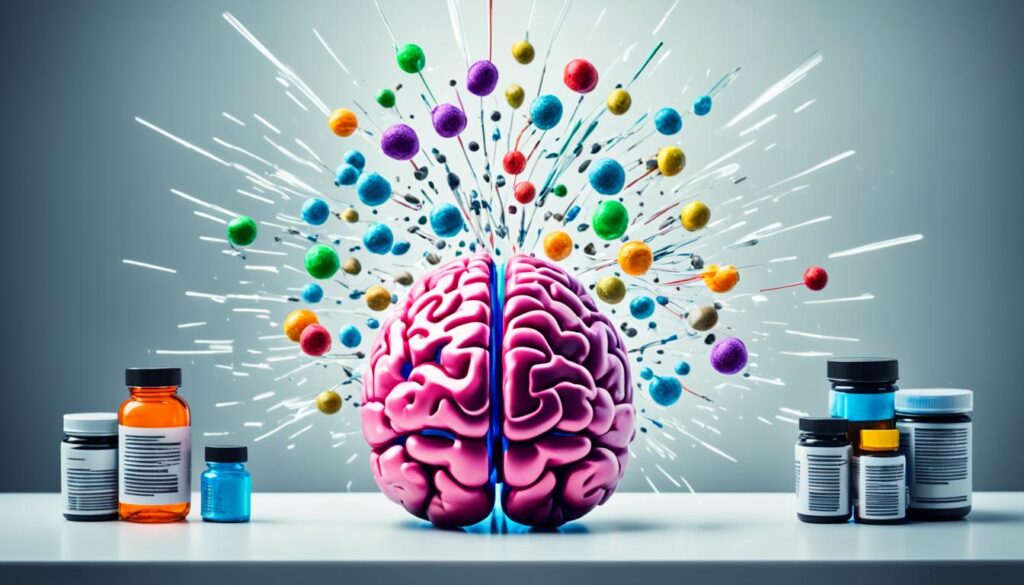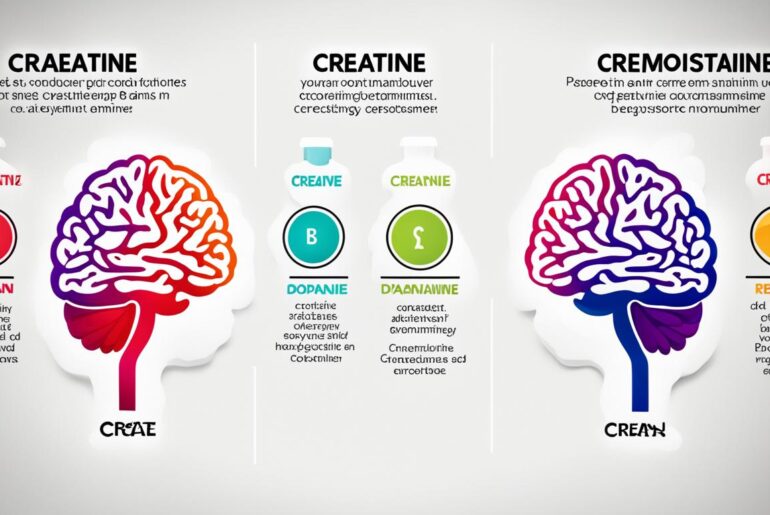As a journalist deeply intrigued by the interplay between diet and cognition, I find it fascinating to uncover research that pushes beyond commonly held beliefs. Here’s a thought-provoking piece of information: while creatine supplementation is widely associated with muscle mass and athletic performance, accumulating evidence suggests its power extends to the brain, offering potential for cognitive enhancement and mental performance.
Creatine isn’t just for gym enthusiasts; it’s a critical brain compound that may aid in boosting executive function improvement. I’ve taken a deep dive into the latest research that not only confirms creatine’s role in replenishing adenosine triphosphate (ATP) – the energy currency of the cell – but also illuminates its unexpected benefits in cognitive domains such as short-term memory and reasoning skills, particularly in individuals adhering to vegetarian diets.
Let’s embark on this exploratory journey together. We’ll review the thought-provoking insights that posit creatine as not just a fitness supplement but a boon for the brain, potentially heralding an era where creatine supplementation becomes a cornerstone for cognitive enhancement strategies.
Key Takeaways
- Creatine supplementation is not limited to physical performance, but may also enhance mental performance, particularly executive function improvement.
- Aside from aiding muscle energy, creatine is a pivotal brain compound that plays a role in cognitive enhancement.
- Studies indicate potential benefits of creatine on short-term memory and reasoning abilities in healthy individuals.
- Vegetarians might experience more significant memory improvements from creatine supplementation compared to meat-eaters.
- The safety profile of creatine, alongside its cognitive benefits, makes it an appealing subject for further research in cognitive health strategies.
- Creatine’s ability to replenish ATP in the brain suggests it could be a safe supplement to test for aging populations and those with cognitive impairments.
Understanding Creatine and Its Role in Cognitive Health
As we delve deeper into the realm of cognitive enhancement, the biological mechanisms behind creatine synthesis and ATP replenishment become crucial. While traditionally linked to physical performance, my exploration today focuses on how creatine serves as more than just muscle fuel—it’s a vital contributor to brain health. Let’s examine the intricate process that underscores creatine’s cognitive function and why it’s gaining recognition for its potential in cognitive enhancement.
An Overview of Creatine Synthesis and Distribution
Creatine synthesis, a complex biochemical process involving amino acids arginine, glycine, and methionine, occurs under the enzymatic guidance of AGAT and GAMT. Transcending beyond muscle tissues, the creatine transporter SLC6A8 dutifully ensures that this compound reaches our neural environments. In the brain, neurons are not just passive recipients; they are capable of endogenous creatine synthesis, underscoring the compound’s significance as an energy buffer at the epicenter of cognitive activities.
The Energy Provision of Creatine in Brain Function
The dynamic conversion of creatine into phosphocreatine by creatine kinase within our neurons is a testament to evolution’s craft—providing an on-the-spot surge of energy through ATP replenishment during high-demand cerebral tasks. Observations on supplementation show a systematic rise in plasma creatine levels, affirming its bioavailability and reinforcing the link to cognitive function enhancement—one leap for phosphocreatine, one giant leap for brain health.
Walking through these biochemical corridors exposes the heightened intersection between creatine’s physiological presence and cognitive prowess. But how does this translate to measurable brain health benefits? The answer might not be straightforward, but evidence-based insights illuminate pathways that we are only beginning to traverse—a journey I’m eager to narrate.
| Cognitive Task | Role of Creatine | Impact on Task Performance |
|---|---|---|
| Memory Recall | ATP replenishment during cell signaling | Potential improvement in retrieval speed |
| Problem Solving | Energy buffer for sustained neuron activity | Increased accuracy and problem-solving efficiency |
| Attention Control | Stabilizes mitochondrial function and energy production | Enhanced attention span during demanding tasks |
What’s clear is that the meticulous dance of molecules within our brains is pivotal to cognitive processes. Optimizing the symphony of creatine synthesis and ATP replenishment might just be the key to unlocking new cognitive enhancement methodologies, and I’m here to make sense of that melody.
Scientific Insights into Creatine and Executive Function

As we dive into the intriguing world of creatine supplementation and its potential effects on executive function improvement, it’s essential to address the rich tapestry of evidence available through clinical trials. These trials are integral to our understanding of how creatine can influence the meticulous performance of cognitive tasks.
The cornerstone of this scrutiny is the PRISMA-guided research methodology, which ensures a standardized and systematic approach to data evaluation. What we’ve found thus far is that the application of creatine appears to yield considerable benefits in certain cognitive aspects, particularly short-term memory and intelligence/reasoning. This echoes the sentiment of myriad enthusiasts promoting cognitive enhancement through supplemental means.
Within the realm of cognitive task performance, these trials have pointed to variable findings that provoke a compelling discussion on creatine’s versatile role. While some studies broadcast clear enhancements in executive function, others suggest a more nuanced and modest impact, underscoring the complexity of our brain’s relationship with supplemental substances.
Let’s turn our attention to a brief encapsulation of the clinical trials focused on creatine’s cognitive prowess:
| Cognitive Domain | Effect of Creatine Supplementation |
|---|---|
| Short-term Memory | Improvements in recall and processing speed |
| Intelligence/Reasoning | Enhanced problem-solving capabilities |
| Reaction Time | Mixed results, some trials show marginal improvements |
| Attention | Inconclusive or very slight enhancements |
This data doesn’t just inform us—it challenges us to delve deeper into the complexities of cognitive enhancements and the role such supplements play. Therefore, I remain committed to exploring the multifaceted nature of creatine supplementation as we continue to uncover new insights into its potential cognitive benefits.
Impact of Creatine on Short-Term Memory and Intelligence
Exploring the nexus between cognitive function and nutrition reveals an intriguing pattern; specifically, the potent effects of creatine supplementation on the brain’s operational abilities. As a writer delving into health and wellness, I’ve sifted through voluminous research to bring forward the compelling connections between mental agility and this popular dietary supplement.
Evidence of Cognitive Enhancement in Healthy Individuals
My inquiry begins by acknowledging the substantial evidence highlighting the positive impact of creatine on cognitive enhancement. In the realm of short-term memory improvement and intelligence enhancement, healthy individuals appear to harness notable benefits upon integrating creatine into their diet. This finding is not merely anecdotal but is backed by a plethora of robust studies, which demonstrate the supplement’s efficacy in bolstering brain function during a variety of cognitive tasks.
Dissecting the Research: Vegetarians vs. Meat-Eaters
The debate on dietary choices takes an intriguing turn when examining the variations in response to creatine between vegetarians and meat-eaters. Current research paints a picture favoring vegetarians, who showcase a more pronounced improvement in memory tasks following creatine supplementation. This disparity between dietary groups emanates from the reality that baseline creatine levels in vegetarians are typically lower due to their meat-free regimen. Ergo, the introduction of creatine as a supplement is posited to level the playing field when it comes to cognitive prowess.
| Cognitive Area | Vegetarians (Before) | Vegetarians (After) | Meat-Eaters (Before) | Meat-Eaters (After) |
|---|---|---|---|---|
| Short-Term Memory | Baseline | Enhanced | Baseline | Moderately Enhanced |
| Intelligence/Reasoning | Baseline | Moderately Enhanced | Baseline | Slightly Enhanced |
| Cognitive Task Response | Baseline | Significantly Enhanced | Baseline | Enhanced |
In synthesizing these insights, it’s imperative to conceive the potential of personalized nutrition strategies that can cater to the unique cognitive needs of individuals, particularly when considering the variables of age and dietary habits. Hence, the ongoing quest for intelligence enhancement and short-term memory improvement may well count creatine among its most valuable allies – especially in settings where vegetarians pursue the same cognitive zeal as meat-eaters.
Creatine’s Potential in Aging and Brain Degeneration

As our population ages, the quest to find effective strategies to combat age-related cognitive decline becomes ever more critical. Research into neuroprotective strategies has honed in on creatine supplementation as a promising ally in this fight. Beyond muscle strength and exercise performance, the potential for creatine to aid in reversing the tide of cognitive decline associated with aging and brain degeneration is a burgeoning area of interest within the scientific community.
Reversing Cognitive Decline Through Supplementation
I’ve observed that with advancing age, brain degeneration often leads to diminished cognitive capacities, impacting the quality of life for many individuals. However, emerging studies suggest that creatine supplementation could play a pivotal role in reversing cognitive decline. This compound, often sidelined as a mere workout enhancer, is showing potential as a critical component of brain health, particularly in its ability to buffer ATP levels and maintain cellular energy balance.
Implications for Neuroprotective Strategies
Exploring the neuroprotective strategies targeting brain degeneration, I am intrigued by how creatine’s ability to increase phosphocreatine reserves can offer a buffer against energy depletion. This points to a novel approach to not only support cognitive function in older adults but also to potentially mitigate the progression of neurodegenerative disorders. While the prospect of employing creatine supplementation as a therapeutic intervention remains in investigative stages, the hypothesis that it could offer protective effects against the ravages of time on the brain is compelling and merits further exploration.
Creatine as a Cognitive Enhancer: How Much Difference Does It Make?
In my quest to unearth the implications of creatine as a cognitive enhancer on mental performance, it has become clear that the pursuit of cognitive enhancement through supplements is rife with nuanced gains. Creatine, traditionally associated with physical strength and endurance, is now rising as a potential enhancer of mental agility. But it begs the question: how impactful is it really? Research advocates for a modest boost, but one that’s not to be dismissed, considering the safety profile of creatine supplementation.
While statistical measures are essential, the real-world benefits of enhanced cognitive function via creatine cannot be overlooked. Those that partake, especially individuals adhering to strict vegetarian diets, often report a palpable uptick in their cognitive capacities. Interestingly, concrete data does not always corroborate a dramatic contrast between dietary preferences, with improvements appearing to be equitable across the board.
| Parameter | Impact on Vegetarians | Impact on Omnivores |
|---|---|---|
| Baseline Creatine Levels | Lower due to dietary restrictions | Higher due to meat consumption |
| Cognitive Performance Post-Supplementation | Mild Improvement | Mild Improvement |
| Reported Side Effects | Minimal | Minimal |
The case for cognitive enhancement via creatine supplementation unfolds in a narrative of gentle progression rather than a revolution. It is the subtle augmentation in mental clarity and the prolonged ability to tackle mental tasks where creatine’s strengths lie. For those hesitant due to vegetative diets or worried about egregious side effects, findings assure minimal risk with a potential for reward.
The Biochemical Mechanism Underpinning Creatine’s Cognitive Effects

My investigation into the cognitive benefits of creatine supplementation reveals a fascinating biochemical mechanism at play. This process is essential to understand how supplementation may support cognitive function, specifically in the demanding context of brain energy metabolism.
Neuronal Energy Supply and Creatine Kinase
Neuronal function depends heavily on the efficient provision of energy. Creatine kinase, an enzyme found abundantly within the brain, plays a critical role in the neuronal energy supply. It catalyzes the conversion of creatine into phosphocreatine, storing the energy required for rapid ATP resynthesis. This conversion is a cornerstone in the brain’s ability to maintain energy homeostasis, particularly during periods of intensified cognitive activity.
Phosphocreatine’s Role in ATP Resynthesis
To appreciate the importance of phosphocreatine, one must delve into its role in ATP resynthesis. ATP, or adenosine triphosphate, is the primary energy currency of the cell. During moments of high energy demand, such as during complex problem-solving or intense learning, phosphocreatine donates a phosphate group to ADP (adenosine diphosphate), rapidly replenishing ATP. This ATP resynthesis ensures that neurons maintain optimal function, underscoring the biochemical rationale for using creatine supplementation to bolster cognitive performance.
In essence, maintaining an optimal level of phosphocreatine within the brain is akin to keeping a full battery charged and ready for the energy demands of rigorous mental processes. Through my exploration of the biochemical mechanism, it’s clear that the link between creatine kinase activity, phosphocreatine, and continuous ATP resynthesis is a fundamental reason why creatine supplementation can enhance neuronal energy supply and, by extension, cognitive function.
Optimizing Brain Health: Who Benefits Most from Creatine Supplementation?

As we delve into the discussion on brain health, we acknowledge the diversity in dietary habits that considerably modulate baseline creatine levels. Clearly, what one eats significantly impacts the availability of this critical neuro-enhancer in our system. Here, I explore how such variations in diet, especially between omnivores and vegetarians, influence the outcomes of creatine supplementation.
The Impact of Dietary Habits on Baseline Creatine Levels
Dietary habits play a pivotal role in establishing baseline creatine levels, which are paramount for gauging creatine supplementation benefits. Vegetarians often showcase reduced levels of creatine in serum and muscle, which begs the question: does their deficit translate to a heightened benefit from supplementation? Interestingly, despite the lower baselines, health-conscious individuals who refrain from animal products might still reap significant cognitive rewards through meticulous creatine supplementation.
The Comparative Response in Omnivores vs. Vegetarians
Omnivores typically maintain higher baseline creatine levels due to their dietary inclusion of meat, which is rich in this organic compound. However, emerging studies suggest that when it comes to enhancing cognition, both vegetarians and omnivores exhibit a similar positive response to creatine supplementation, alluding to a shared potential for optimizing brain health across different dietary backgrounds.
| Dietary Group | Baseline Creatine Levels | Post-Supplementation Cognitive Improvement |
|---|---|---|
| Omnivores | Higher | Significant |
| Vegetarians | Lower | Significant |
In conclusion, it becomes clear that while dietary habits do influence baseline creatine levels, with vegetarians usually starting at a lower point than omnivores, the cognitive enhancements from creatine supplementation show surprising uniformity. This insight propels the narrative that the brain health of a wide demography may benefit from creatine regardless of one’s dietary predisposition towards or against meat consumption.
Methodological Considerations in Creatine Research

In my exploration of creatine research, I place a strong emphasis on the methodological rigor of studies to provide the most authentic insights into its cognitive effects. At the forefront are randomized clinical trials, which are indispensable in establishing a strong scientific foundation for supplement recommendations.
Randomized Clinical Trials and Their Significance
Randomized clinical trials (RCTs) are the cornerstone of creatine research, as they provide the most robust level of evidence in the scientific community. Through careful design and implementation, RCTs utilizing creatine supplementation aim to shed light on cognitive enhancements, directly impacting nutritional strategies and personal health decisions.
Assessing the Risk of Bias in Creatine Studies
Understanding the risk of bias in creatine studies is paramount. Bias can stem from various sources, such as selection, performance, detection, and attrition bias. I meticulously evaluate the methodology of trials to gauge their quality and potential factors that may skew results. By doing so, I strive to guide readers towards the most reliable findings.
| Study Criteria | Description | Impact on Risk of Bias |
|---|---|---|
| Sample Size | Number of participants in the trial | Smaller sample sizes may increase the risk of chance findings |
| Blinding | Whether study participants and researchers are aware of the intervention | Non-blinded studies can introduce performance and detection biases |
| Allocation Concealment | Secrecy of the randomization process | Poor allocation concealment may lead to selection bias |
| Follow-Up | Duration of participant observation post-intervention | Inadequate follow-up can cause attrition bias through loss of participants |
| Outcome Reporting | Comprehensive reporting of all study results | Selective reporting of outcomes may introduce reporting bias |
My discussions incorporate **methodological considerations** such as sample size, blinding, allocation concealment, length of follow-up, and outcome reporting. These factors, when meticulously reviewed and taken into account, contribute to validating the efficacy of creatine in cognitive function enhancement and inform on the meticulous nature of such investigations in the ongoing conversation within the scientific community.
Adverse Effects and Safety Profile of Creatine Supplementation
In my scrutiny of the safety profile of creatine, I’ve noted that it’s largely deemed safe with a few minor adverse effects. One of the most common effects is a nominal weight gain attributed to water retention in the body. Despite such effects, the supplement’s prevalent use amongst athletes and individuals seeking cognitive enhancement continues, primarily due to its minimal side effects. However, I am prudent to mention that while current studies affirm creatine’s safety, ongoing and larger-scale research is essential to sustain these claims over extended periods.
From my perspective, the risks associated with creatine supplementation appear to be relatively low. However, it is crucial that individuals are fully apprised of any potential creatine supplementation risks before commencing use. Monitoring by healthcare professionals may be advised for those with pre-existing conditions or for those who are considering long-term use. This ensures not only the safety profile but also the utility of creatine in their specific circumstances. Given that the general consensus is supportive of creatine’s safety, it emerges as an intriguing subject for further exploration in cognitive health domains.
My analysis leads to the conclusion that creatine’s broad availability and its reputation for being a low-risk supplement shape it as an attractive candidate for future investigations within the realm of cognitive enhancement. It fosters ambition for additional research that might unlock further potential benefits or elucidate the contexts in which creatine might be most efficacious. The current acknowledged adverse effects do not overshadow the potential gains, thereby supporting the ongoing inclusion of creatine within cognitive health discourse.
FAQ
What are the benefits of creatine supplementation for executive function improvement?
Creatine supplementation has been linked to improvements in cognitive enhancement, mental performance, and executive functioning, which includes memory improvement, attention and focus, decision making, and problem-solving abilities. These benefits are largely attributed to creatine’s role in replenishing ATP, which is essential for brain energy metabolism.
How is creatine synthesized and distributed in the body?
Creatine is synthesized from amino acids arginine, glycine, and methionine through the action of enzymes AGAT and GAMT and is distributed by the creatine transporter SLC6A8. It is particularly important in the brain, where it acts as an energy buffer and is capable of endogenous synthesis in neurons.
Is there scientific evidence supporting the role of creatine in enhancing cognitive tasks performance?
Yes, a body of scientific literature, including randomized clinical trials, suggests that creatine supplementation can enhance performance in cognitive tasks that require executive function. These studies underscore creatine’s potential impact on cognitive health, though the extent of its effects varies depending on individual factors and the specific cognitive domains examined.
Does creatine supplementation help to improve short-term memory and intelligence?
Research indicates that oral creatine administration can enhance short-term memory and intelligence/reasoning, particularly in healthy individuals. Clinical trials continue to explore these cognitive domains to establish a clearer connection between creatine supplementation and cognitive improvements.
Are vegetarians more likely to benefit from creatine supplementation for memory tasks?
Vegetarians often have lower baseline creatine levels due to their diet and some studies suggest that they might experience a more notable improvement in memory tasks. However, not all research consistently supports this difference, and both vegetarians and meat-eaters could benefit from creatine supplementation for cognitive enhancement.
Can creatine supplementation aid in reversing cognitive decline or offer neuroprotective benefits?
There is promise in using creatine supplementation to reverse cognitive decline and offer neuroprotective benefits, especially in aging populations or those experiencing metabolic stress. It may represent a therapeutic option for conditions like cerebral creatine deficiency syndromes and other neurodegenerative disorders, although further research is needed to confirm these uses.
What differences does creatine make as a cognitive enhancer?
While the overall effect size might be small, creatine supplementation has been shown to have a beneficial impact on cognitive enhancement, particularly in tasks requiring a quick supply of energy. It is associated with minimal side effects, making it a compelling option for further exploration in cognitive health interventions.
What is the biochemical mechanism behind creatine’s cognitive effects?
The cognitive effects of creatine are largely due to its role in energy metabolism. Creatine kinase converts creatine to phosphocreatine, which stores and provides high-energy phosphate groups for the resynthesis of ATP in neurons, critical during high-demand cognitive activities.
Who benefits the most from creatine supplementation for optimizing brain health?
Individuals with lower baseline creatine levels, such as vegetarians, might see more significant cognitive improvements from creatine supplementation. However, studies show comparable cognitive benefits for both vegetarians and omnivores, suggesting that various factors, including dietary habits, influence supplementation responsiveness.
What methodological considerations are important in creatine research?
Randomized clinical trials, particularly those adhering to PRISMA guidelines, are essential for evaluating the effectiveness of creatine on cognition. Such rigorous approaches help minimize bias and provide more reliable and conclusive evidence on the cognitive benefits of creatine supplementation.
What are the known adverse effects and safety considerations of creatine supplementation?
Creatine is generally considered safe with a well-established safety profile. The most common adverse effect reported is slight weight gain due to increased water retention in the body. However, larger studies are required to confirm the long-term safety of creatine supplementation.




